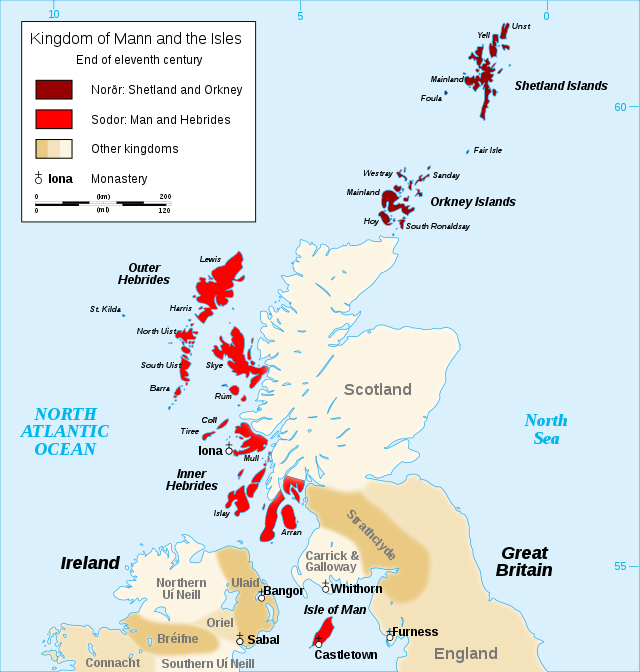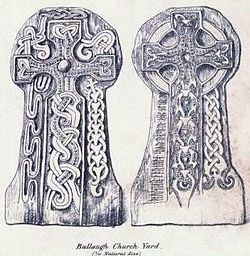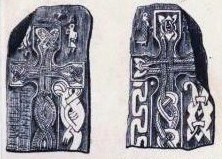Top Qs
Timeline
Chat
Perspective
Manx runestones
Stone with a runic inscription From Wikipedia, the free encyclopedia
Remove ads
Remove ads
The Manx runestones were made by the Norse population on the Isle of Man during the Viking Age, mostly in the 10th century. The Isle of Man (with an area of 572 square kilometres (221 sq mi)[1] and a population estimated by the Venerable Bede in the 8th century at 1200 families)[2] had 26 surviving Viking Age runestones in 1983, compared to 33 in all of Norway.[3] The relatively high number of them may appear on the Isle of Man because of the merging of the immigrant Norse runestone tradition with the local Celtic tradition of raising high crosses.[3]

In addition, the church contributed by not condemning the runes as pagan, but instead it encouraged the recording of people for Christian purposes. Sixteen of the stones bear the common formula, "N ... put up this cross in memory of M", but among the other ten there is also a stone raised for the benefit of the runestone raiser.
The Manx runestones are consequently similar to the Scandinavian ones,[4] but whereas a Norwegian runestone is called "stone" in the inscriptions, even if it is in the shape of a cross, the runestones that were raised in the British isles are typically called "crosses".[5] There are also two slabs incised with Anglo-Saxon runes at Maughold.[6]
Remove ads
Andreas parish
Summarize
Perspective
Br Olsen;183 (Andreas (I), MM 99)

This runestone is a stone cross that is located in the church Andreas. The inscription is in short-twig runes and it commemorates a father.
...
...
(þ)[an](a)
þenna
:
[aft]
ept
(u)(f)(a)ik
Ófeig,
:
fauþur
fǫður
:
sin
sinn,
:
in
en
:
kautr
Gautr
:
kar[þ]i
gerði,
:
sunr
sonr
:
biarnar
Bjarnar
f(r)(a)
frá
:
(k)(u)(l)(i)
Kolli.
[:]
"... this [cross] in memory of Ófeigr, his father, but Gautr made (it), the son of Bjǫrn from Kollr."[7]
Br Olsen;184 (Andreas (II), MM 131)

This stone cross is located in the church Andreas. It is engraved with short-twig runes, and it is dated to c. 940. It was erected in memory of a wife.
sont:ulf
Sandulfr
:
hin
hinn
:
suarti
Svarti
:
raisti
reisti
:
krus
kross
:
þona
þenna
:
aftir
eptir
:
arin:biaurk
Arinbjǫrgu,
*
kuinu
konu
:
sina
sína.
(u)
...
[*]
k
...
:
au
...
[*]:
(o)ks/(b)ks
...
"Sandulfr the Black erected this cross in memory of Arinbjǫrg his wife. ..."[8]
Thorwald's Cross: Br Olsen;185A (Andreas (III), MM 128)

Referred to as Thorwald's Cross, this stone cross is found in the church Andreas. Only attribution to the one who raised the stone—Þorvaldr—remains of the message inscribed on the cross.[9] It has been badly damaged since it was recorded.[10] The stone depicts a bearded human holding a spear downward at a wolf, his right foot in its mouth, while a large bird sits at his shoulder.[11] Rundata dates it to 940,[9] while Pluskowski dates it to the 11th century.[11]
This depiction has been interpreted as the Norse pagan god Odin, with a raven or eagle at his shoulder, being consumed by the wolf Fenrir during the events of Ragnarök.[12] Next to the image is a depiction of a large cross and another image parallel to it that has been described as Christ triumphing over Satan.[13] These combined elements have led to the cross as being described as "syncretic art"; a mixture of pagan and Christian beliefs.[11] Andy Orchard comments that the bird on Odin's shoulder may be either Huginn or Muninn, Odin's ravens.[14]
þurualtr
Þorvaldr
÷
(r)[aisti]
reisti
(k)(r)(u)(s)
kross
÷
(þ)[...]
þe[nna].
"Þorvaldr raised (this) cross."[9]
Br Olsen;185B (Andreas (IV), MM 113)
This stone cross is located in the church Andreas. It is engraved with short-twig runes and it is dated to the 10th century. What remains of the message informs that it was raised in memory of someone.
[...
...
...ai]s[t]i
reisti
:
[k]rus
kross
:
þaina
þenna
:
aftiʀ
eptir
...
...
"... raised this cross in memory of ..."[15]
Br Olsen;185C (Andreas (V), MM 111)

Only fragments remain of this stone cross, and they are located in the church Andreas. The inscription has not been deciphered, but it is of note as it consists of unusual twig runes and bind runes.[16]
Br Page1998;9 (Andreas (VI), MM 121)
Only a fragment remains of this slab of stone that was once part of a grave. It is dated to the Viking Age and it is located in the church Andreas. Too little remains of the inscription to allow any decipherment.
ka-
...
"..."[17]
Br NOR1992;6B (Andreas (VII), MM 193)
This fragment was discovered at Larivane Cottage it is a slab of stone was once part of a grave. The inscription was made in relief form, and it is located in the Manx Museum. What remains of the inscription cannot be read.[18]
Remove ads
Ballaugh parish
Br Olsen;189 (Ballaugh, MM 106)

This stone cross is located in Ballaugh. The inscription consists of short-twig runes and they are dated to the second half of the 10th century. It was raised in memory of a son.
oulaibr
Áleifr/Óleifr
÷
liu(t)ulbs|
Ljótulfs
|sunr
sonr
:
r[ai](s)[ti
reisti
k]rs
kross
*
þ-na
þ[e]nna
:
ai(f)(t)ir
eptir
*
...-b
[Ul]f,
:
sun
son
[s]in
sinn.
"Áleifr/Óleifr, Ljótulfrs son raised this cross in memory of Ulfr, his son."[19]
Remove ads
Lezayre parish
Br Olsen;190A (Balleigh)
These fragments of a stone cross are found at Balleigh, and they are dated to the Viking Age. Only traces of runes remain and they cannot be read.[20]
Braddan parish
Summarize
Perspective

Br Olsen;190B (Braddan (I), MM 112)
This stone cross is located in the church Braddan. The inscription consists of short-twig runes and they are dated to 930–950. It was raised in memory of a man.
(þ)(u)(r)...
Þorsteinn
:
raisti
reisti
:
krus
kross
:
þono
þenna
:
ift
ept
:
ufaak
Ófeig,
:
sun
son
:
krinais
Krínáns.
"Þorsteinn raised this cross in memory of Ófeigr, the son of Krínán."[21]
Br Olsen;191A (Braddan (II), MM 138)

This stone cross is found in the church Braddan. The inscription consists of short-twig runes and it is dated to the second half of the 10th century. It reports betrayal.
...
...
...(n)
[e]n
roskitil
Hrossketill
:
uilti
vélti
:
i
í
:
triku
tryggu
:
aiþsoara
eiðsvara
:
siin
sinn.
"... but Hrosketill betrayed the faith of his sworn confederate."[22]
Br Olsen;191B (Braddan (III), MM 136)

This stone cross is found in the church Braddan. The inscription consists of short-twig runes and it is dated to the 980s. The runemaster is identified as man named Thorbjörn, who also made Br Olsen;193A, below.[23] It has been badly damaged since it was recorded.[10]
utr
Oddr
:
risti
reisti
:
krus
kross
:
þono
þenna
:
aft
ept
:
fro(k)(a)
Frakka,
[:
f](a)(þ)[ur
fǫður
sin
sinn,
:
in
en
:]
(þ)[urbiaurn
Þorbjǫrn
:
...]
...
"Oddr raised this cross in memory of Frakki, his father, but ... ..."[23]
Br Olsen;193A (Braddan (IV), MM 135)

This runestone which is dated to the 980s is found in the church Braddan. The inscription consists of short-twig runes and they were made by the runemaster Thorbjörn, like Br Olsen;191B, above. It was made in memory of a son.
þurlibr
Þorleifr
:
nhaki
Hnakki
:
risti
reisti
:
krus
kross
:
þono
þenna
:
aft
ept
[:]
fiak
Fiak,
:
s(u)[n]
son
(s)in
sinn,
:
(b)ruþur:sun
bróðurson
:
habrs
Hafrs.
×
IHSVS
ihsvs>
"Þorleifr the Neck raised this cross in memory of Fiak, his son, Hafr's brothers son. ihsvs"[24]
Br Page1998;20 (Braddan (V), MM 176)
This fragment of a runestone is located in Manx Museum. It is probably from the Viking Age, but as of 2006, it had not yet been analysed.[25]
Br NOR1992;6A (Braddan (VI), MM 200)
This runestone consists of a fragment of slate. It is dated to the Viking Age and it is located in Manx Museum. The only message that remains consists of "made".
gerði would also translate into modern Swedish as gjorde or English did ... The meaning of the words made or did depends on the original context of the sentence as a whole (or at least the words surrounding this single word), which here appears lost.
The current use of the Swedish word gjorde is much more closely related to did than the word made. Which is intended is impossible to say here.
Remove ads
Bride parish
Br Olsen;193B (MM 118)
This stone cross is found in the church Bride. The inscription consists of short-twig runes and it is dated to between 930 and 950. It was raised in memory of a wife.
[t]ruian
Druian,
:
sur
sonr
[t]u(f)kals
Dufgals,
:
raisti
reisti
krs
kross
þina
þenna
:
a(f)[t]
ept
aþmiu...
Aþmiu[l],
:
kunu
konu
si[n...]
sín[a].
"Druian, Dufgal's son raised this cross in memory of Aþmiu[l], his wife."[27]
Remove ads
Onchan parish
Br Olsen;194 (MM 141)

This runestone consists of a short-twig runic inscription on an old Irish stone cross. The inscriptions A, B and C date from the Viking Age, while D is later. A and B were made by the same scribe, C and D were made by a second and a third one, while a fourth scribe made E, F and G.
A
...(a)
...
sunr
sonr
×
raisti
reisti
×
if(t)
ept
[k](u)[i](n)(u)
konu
(s)(i)(n)(a)
sína
×
"...'s son raised (this) in memory of his wife"
B
murkialu
Myrgjǫl
×
m...
...
"Myrgjǫl ..."
C
×
uk
Hygg
ik
ek
at
×
at
auk
ok
raþ
ræð
ik
ek
r...t
r[é]tt.
×
"I examine (the runes) and I interpret (them) rightly.(?)"
D
a=læns
Alleins.
"in agreement(?)"
E
kru...
Kro[ss]
"Cross"
F
isu
Jésu
krist
Krist
"Jesus Christ"
Remove ads
German parish
Br Olsen;199 (German (I), MM 107)

This stone cross is located in the chapel of Saint John. The inscription is in short-twig runes and it is dated to between 930 and 950. The inscription is secondary and it is poorly preserved. Only a few main staffs are visible.
...
...
in
En
o(s)(r)(u)(þ)(r)
Ásrøðr
:
raist
reist
:
runar
rúnar
:
þsar
þessar.
× ¶
-----
...
-
...
"... and Ásrøðr carved these runes. ... ..."[29]
Br Olsen;200A (German (II), MM 140)

This stone cross is found in Manx Museum. The inscription is in short-twig runes, but it may be later than the Viking Age. It was inscribed in memory of a wife.
...
...
...
...
...(u)s
[kr]oss
*
þense
þenna
*
efter
eptir
*
asriþi
Ástríði,
*
kunu
konu
sina
sína,
*
(t)(u)(t)ur
dóttur
*
ut...
Odd[s].
...-
...
"... ... this cross in memory of Ástríðr, his wife, Oddr's daughter ..."[30]
Remove ads
Jurby parish
Br Olsen;200B (MM 127)

This stone cross is found in Jurby and the short-twig runes are dated to the second half of the 10th century.[31] It has been badly damaged since it was recorded.[10] One of the figures depicted on the cross holds a small sword in his right hand and an Alpine horn in his left while a raven flies overhead. It has been suggested that this figure represents the Norse pagan deity Heimdall holding the Gjallarhorn, used to announce the coming of Ragnarök.[32]
[...
...
...
...
...un
[s]on
*
si]n
sinn,
:
in
en
:
onon
annan
:
raiti
reisti/rétti
¶
---
[hann](?)
*
aftir
eptir
þurb-...
Þor...
"... ... his son and raised(?) another ... in memory of Þorb-..."[31]
Remove ads
Marown parish
Br Olsen;201 (MM 139)
This stone cross is located in Saint Trinian's chapel. The short-twig inscription is dated to the Viking Age.
Maughold parish
Summarize
Perspective

Br Olsen;202A (Maughold (I), MM 145)
This runic inscription is found on a stone slab that was used in a grave. It is located near the church Maughold. The inscription is dated to the second half of the 12th century, and it was made by the same runemaster as Br Olsen;202B. On the stone can also be seen the first half of the Ogham alphabet.

(i)(u)an
Jóan
+
brist
prestr
+
raisti
reisti
+
þasir
þessar
+
runur
rúnar.
+¶
[f]uþor(k)(h)niastbml
⟨fuþorkhniastbml⟩
+
"Jóan the priest carved these runes. Fuþorkhniastbml"[34]
Br Olsen;202B (Maughold (II), MM 144)
This inscription is found on a slab of stone that was used in a grave. It was discovered at the upper end of the Corna valley, but is now at the church Maughold. The short-twig inscription is dated to the second half of the 12th century and it was made by the same runemaster as Br Olsen;202A.
+
krisþ
Kristr,
:
malaki
Malaki
:
ok
ok
baþr(i)k
Patrik.
:
(a)þ(a)(n)man
Adamnán
(×) ¶ ÷
[...nal]
...
*
sauþ
...
*
a...
...
*
iuan
Jóan
*
brist
prestr
*
i
í
kurnaþal
Kornadal.
*
"Christ, Malachi, and Patrick. Adamnán ... Joán the priest in Kornadalr."[35]
Br Olsen;205A (Maughold (III), MM 133)
This fragment of a stone cross was found in Ballagilley. It is now located at the church Maughold. It is dated to the Viking Age but only four runes remain of the inscription.[36]
Br Olsen;205B (Maughold (IV), MM 142)

This inscription is dated to c. 1000 and found on a slab of stone that was used in a grave, and it is located at the church Maughold. The inscription is in long-branch runes, except for the s rune, and there is reason to believe that it was made by a visitor to the Isle of Man.
A
heþin
Heðinn
:
seti
setti
:
krus
kross
:
þino
þenna
:
eftir
eptir
:
tutur
dóttur
:
sino
sína
¶
lif...
Hlíf[hildi].
¶
lifilt
Hlífhildi.
"Heðinn placed this cross in memory of his daughter Hlíf(hildr). Hlífhildr."
B
arni
Árni
:
risti
risti
:
runar
rúnar
:
þisar
þessar.
"Árni carved these runes."
Br Page1998;21 (Maughold (V), MM 175)
This inscription is found on a slab of stone that was used in a grave. It is located in the Manx Museum. It is in short-twig runes and it is dated to the Viking Age. It was engraved in memory of a wife.
kuan
⟨kuan⟩,
sunr
sonr
×
mailb—ak...
⟨mailb---ak...⟩
+
kirþi
gerði
+
lik+tinn
líkstein(?)
i(f)tir
eptir
+ ¶ +
kuina
kona
sina
sína.
+
"⟨kuan⟩, son of ⟨mailb---ak...⟩ made the tomb-stone(?) in memory of his wife."[38]
Remove ads
Michael parish
Summarize
Perspective
Br Olsen;208A (Kirk Michael (I), MM 102)

This fragment of a stone cross is located in the church Kirk Michael. The inscription in short-twig runes is dated to the Viking Age.
Br Olsen;208B (Kirk Michael (II), MM 101)

This stone cross is located in the church Kirk Michael, and it is dated to the Viking Age. The inscription is in short-twig runes and it was dedicated to a man while he was alive.
×
mail:brikti
Melbrigði,
:
sunr
sonr
:
aþakans
Aðakáns
:
smiþ
Smiðs,
:
raisti
reisti
:
krus
kross
:
þano
þenna
:
fur
fyr
:¶
salu
sálu
:
sina
sína
:
sin:bruku
synd...(?),
in
en
:
kaut
Gautr
׶
kirþi
gerði
:
þano
þenna
:
auk
ok
¶
ala
alla
:
i
í
maun
Mǫn.
×
"Melbrigði, the son of Aðakán the Smith, raised this cross for his sin ... soul, but Gautr made this and all in Man."[40]
Br Olsen;215 (Kirk Michael (III), MM 130)

This is an old Irish stone cross that received an inscription in long branch runes, and it was probably by a Danish visitor in the 11th century. There are ogham inscriptions on both sides.
mal:lymkun
⟨mallymkun⟩
:
raisti
reisti
:
krus
kross
:
þena
þenna
:
efter
eptir
:
mal:mury
⟨malmury⟩
:
fustra
fóstra
:
si(n)e
sín,
:
tot(o)r
dóttir
:
tufkals
Dufgals,
:
kona
kona
:
is
er
:
aþisl
Aðísl
:
ati
átti.
+ ¶
...etra
Betra
:
es
er
:
laifa
leifa
:
fustra
fóstra
:
kuþan
góðan
:
þan
en
:
son
son
:
ilan
illan.
+
"⟨Mallymkun⟩ raised this cross in memory of ⟨Malmury⟩, his foster(-mother?), Dufgal's daughter, the wife whom Aðísl owned (= was married to). (It) is better to leave a good foster-son than a wretched son."[41]
Br Olsen;217A (Kirk Michael (IV), MM 126)

This is a stone cross that is found in the church Michael. The inscription with short-twig runes was made in the second half of the 11th century.
[k](r)i(m)
Grímr
:
risti
reisti
:
krus
kross
:
þna
þenna
:
ift
ept
:
rum(u)...
Hróðmu[nd]
...
...
"Grímr raised this cross in memory of Hróðmundr ... his ..."[42]
Br Olsen;217B (Kirk Michael (V), MM 132)

This is a stone cross that is located in the church Michael. The inscription in short-twig runes was made in the 980s by a runemaster named Thorbjörn.
+
iualfir
⟨iualfir⟩,
:
sunr
sonr
:
þurulfs
Þórulfs
:
hins
hins
:
rauþa
Rauða,
:
ris(t)i
reisti
:
krus
kross
:
þono
þenna
:
aft
ept
:
friþu
Fríðu,
:
muþur
móður
:
sino
sína.
+
"⟨iualfir⟩, the son of Þórulfr the Red, raised this cross in memory of Fríða, his mother."[43]
Br Olsen;218A (Kirk Michael (VI), MM 129)

This stone cross is located in the church Michael. It was engraved with short-twig runes in the second half of the 10th century.
Br Olsen;218B (Kirk Michael (VII), MM 110)
This fragment of a stone cross is located in the church Kirk Michael. The inscription was made in short-twig runes between 930 and 950.
Br Olsen;219 (Kirk Michael (VIII), MM 123)
This fragment of a stone cross is located in the church Kirk Michael. The inscription was made during the Viking Age with short-twig runes.
Remove ads
See also
Notes
References
Wikiwand - on
Seamless Wikipedia browsing. On steroids.
Remove ads
